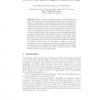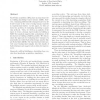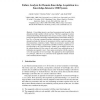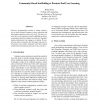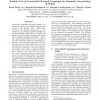80
Voted
ATAL
2005
Springer
15 years 8 months ago
2005
Springer
Abstract. Elderly people are a great repository of knowledge, the majority of which has never been gathered by formal means. In this paper we introduce an application of multi-agen...
121
Voted
IUI
2005
ACM
15 years 8 months ago
2005
ACM
At the Media Lab we are developing a resource called StoryNet, a very-large database of story scripts that can be used for commonsense reasoning by computers. This paper introduce...
109
click to vote
IUI
2005
ACM
15 years 8 months ago
2005
ACM
In order for intelligent systems to be applicable in a wide range of situations, end users must be able to modify their task descriptions. We introduce Tailor, a system that allow...
113
click to vote
IAT
2005
IEEE
15 years 8 months ago
2005
IEEE
This paper describes an agent-based recommendation system developed to support knowledge acquisition and sharing processes. Its purpose is to aid the process of community building...
ACSC
2005
IEEE
15 years 8 months ago
2005
IEEE
Knowledge acquisition (KA) plays an important role in building knowledge based systems (KBS). However, evaluating different KA techniques has been difficult because of the costs...
114
click to vote
ICCBR
2007
Springer
15 years 8 months ago
2007
Springer
A knowledge-intensive case-based reasoning system has profit of the domain knowledge, together with the case base. Therefore, acquiring new pieces of domain knowledge should impro...
123
Voted
VL
2007
IEEE
15 years 8 months ago
2007
IEEE
End-user programming provides a unique opportunity to study informal computer science education and knowledge acquisition in the real world. We seek to explore the use of communit...
128
click to vote
HICSS
2008
IEEE
15 years 8 months ago
2008
IEEE
How to achieve knowledge creation effectively remains a problem, this becomes even more difficult in a loosely knitted community such as networks of practice. This is because know...
107
click to vote
WIKIS
2009
ACM
15 years 8 months ago
2009
ACM
Software development is a knowledge-intensive activity and frequently implies a progressive crystallization of knowledge, towards programming language statements. Although wikis h...
108
Voted
ESWS
2009
Springer
15 years 9 months ago
2009
Springer
Knowledge Acquisition through Semantic Annotation is vital to the evolution, growth and success of the Semantic Web. Both Semiautomatic and Manual Annotation are constricted by a ...
